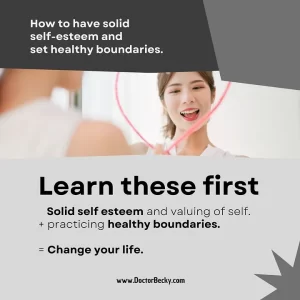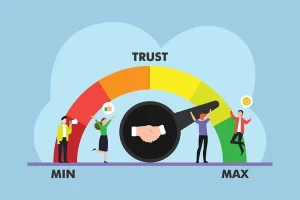Counseling & Therapy for Individuals, Couples, & Families in Little Rock, AR. Find out when therapy is indicated, Becky's … Learn More
When a person begins their journey to get healthy, the first step is to learn what healthy self-esteem and boundaries are, and to implement these components into their daily life. Get these two areas on board and working as they should, and your life will transform. Your mental well-being and personal relationships will improve, and then you can move on to deepen your awareness in the other three core areas that will send you into recovery from Childhood Developmental Trauma (CDT), perception (seeing and processing information accurately), dependency, and moderation. It’s a journey that is well-worth the time and effort.
Self-Esteem.
When a person has healthy self-esteem, they value themselves every day, all the time. They know that because they are a human being, they were born precious and valuable. It is an acceptance and appreciation of oneself that is constant and cannot be lost or taken away. It is not dependent on how smart or beautiful you are, how hard you work, how clean your house is, what others think of you, or anything else. If you see someone who has this, you may notice they practice self-care, they make sure their own needs are met, they get physical check ups, take care of their mind and body, get help when needed, they know who they are, and work to live their life authentically, knowing that is what one must do to thrive though the lifespan.
The person with healthy self-esteem avoids comparing themselves to others and harshly judging themself, they learn how to control the negative voice in their head and foster a warm and compassionate relationship with themself. For example, I started adult life as dysfunctional as it gets. I shamed myself for every mistake and bad decision, undervalued my talents and gifts, and kept myself from sticking my neck out to create opportunities because I figured I’d be rejected anyway. I did all these things until I learned not to do them. Now I have nothing but love and compassion for the mistake making woman I am. I look back at 25-year-old clueless Becky who sabotaged herself more times than I can count, and send her only love, understanding, and compassion. The journey of personal growth and…









 Becky Whetstone is an Arkansas native and has a Ph.D. in Marriage and Family Therapy from St. Mary’s University in San Antonio, Texas. She is a Licensed Marriage and Family Therapist (LMFT) in Texas and Arkansas.
Becky Whetstone is an Arkansas native and has a Ph.D. in Marriage and Family Therapy from St. Mary’s University in San Antonio, Texas. She is a Licensed Marriage and Family Therapist (LMFT) in Texas and Arkansas. 





















































































































